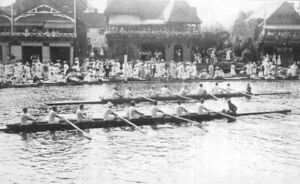Business & Education
Recalling the boys from Roskilde – Denmark’s Olympic rowing heroes of 1948
This article is more than 10 years old.
How Finn Pedersen, Tage Henriksen and Carl-Ebbe Andersen made up Denmark’s winning rowing team at the 1948 Olympics, bringing home the gold in the now discontinued coxed pairs event

Jubilation in Henley without the aid of Pimm’s
Heading into the 2012 Olympics in London, there were strong hopes Denmark would excel given its previous endeavours in the English capital.
The last time the epic sporting event was held in the British capital, 1948 proved to be a particularly successful year for Denmark, which chalked up its best ever results at an Olympic Games, winning 20 medals, including five golds.
Okay, that might be a slight exaggeration. Team Danmark were incredibly pessimistic beforehand, predicting only seven medals. In the end they won nine.
Read More: Seven Olympic medals: pie in the sky or feet on the ground?
Read More: Team Danmark had a good Olympics, but how did their predictions fare?
The Austerity Games
Following the Second World War, there had been no Olympic Games held for more than a decade, and a total of 59 nations participated. Japan and Germany, which were still under Allied military occupation, were not permitted to compete, while the Soviet Union chose not to.
London had been due to host the 1944 games, but the event was derailed by the war. Tokyo, the original 1940 host, had in the late 1930s, handed over responsibility to Helsinki, which eventually hosted the games in 1952.
Nevertheless, despite London leapfrogging the Finns, there were doubts over the English capital’s hosting suitability. Rationing was still in force, and there were shortages of everything from food to petrol and accommodation, which led to many believing that London was not yet ready to host the event.
Naturally, good old British spirit prevailed, and with improvised measures such as using RAF camps and college dorms in lieu of an Olympic Village, the 1948 Olympics went ahead, although it did become known as the ‘Austerity Games’.
From Roskilde to Henley
Still, austerity doesn’t affect the weather. It was a gloriously hot summer that year in England, and affluent Henley in Oxfordshire, with its long-standing history of rowing events, was radiant.
And it was here that three colleagues from the provincial Roskilde Rowing Club – Finn Pedersen, Tage Henriksen and their 19-year-old coxswain Carl-Ebbe Andersen – made their mark, winning gold in the coxed pairs rowing event.
The boys from Roskilde had to make do with coming in second in the preliminary heats, before narrowly seeing off France in a nail-biting semi-final. But in the final, they bided their time and then, when it mattered most, pushed past the Italian and Hungarian teams to take the gold medal on 9 August 1948.
The team’s victory was particularly sweet for their local sports club, cementing Roskilde Rowing Club’s reputation as one of the top rowing clubs in the country. It’s also one of Denmark’s oldest – it was founded in 1890.
Roskilde has been breeding sailors since the Vikings began building longboats – as the town’s Viking Ship Museum can testify – making good use of the spectacular fjord that snakes northwards out of the town.
Finn at home in the water
Twice-national champion Finn Pedersen, who died in January 2012 at the age of 86, never stopped being involved in rowing, even after his retirement. He was the chairman of Roskilde Rowing Club for several decades and remained an active member of the club right up until his death, and a great inspiration to the club’s youngest members.
Along with Henriksen and Andersen, Pedersen had won his first national championship in 1947, and after the Olympic win in 1948, the team held onto the national trophy in 1950, albeit with Henriksen making room for Kai Suhr.
Switching then to coxless pairs, Pedersen paired up with another colleague from Roskilde Rowing Club, Kjeld Østrum, to dominate the national championships in the 1950s. Success continued up until 1956, but the pair’s efforts at that year’s Olympic Games in Melbourne failed to match previous achievements, when they were eliminated in the semis.
Discontinued after 1992
The men’s coxed pairs event was discontinued as an Olympic event after 1992, along with a number of other rowing events. In its place, a new event made its debut at the 1996 Atlanta Olympics: the lightweight men’s four.
Denmark took to this event like a duck to water and has brought home the gold in the lightweight men’s four more often than any other nation.










































